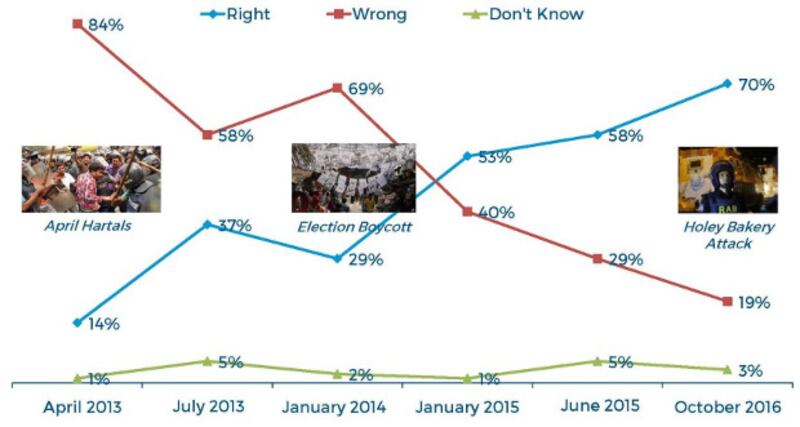A recent public opinion survey shows that Bangladeshi citizens think their country is heading in the right direction and the government is doing an excellent job in preventing terrorist attacks.
But a majority of respondents also believe that political parties in Bangladesh are more responsible for current violence than are extremists or criminals, according to the survey by Democracy International (DI), a U.S-based NGO.
A total of 1,453 Bangladeshi citizens ages 18 to 65 participated in a Computer-Assisted Telephone Survey System (CATSS) conducted by DI between Oct. 23 and 31.
Keeping the male to female ratio at 50 percent, DI randomly selected those participants among Bangladesh’s 100 million-plus mobile phone users, where 77 percent represented rural and 23 percent represented urban neighborhoods.
While addressing a question regarding Bangladesh’s progress in the overall socio-political situation over the past three years, 70 percent of respondents said that Bangladesh was in a far better position in October 2016 than in April 2013, while 19 percent said that the situation worsened during this period.
In other findings, 31 percent of respondents made political parties responsible for the current violence in the country, while 20 percent blamed the extremists and 19 percent blamed criminals.
To some extent Bangladeshi political leaders agreed with the survey.
Atiur Rahman Atik, the parliamentary whip of the ruling Awami League party, said the allegation was not baseless.
“Few leaders do practice violence for their personal gains. But unfortunately the blame goes to all political parties,” he told BenarNews. He emphasized that most current leaders were committed to democratic and healthy political practices and cultures.
Mahbubur Rahman, member of the opposition Bangladesh Nationalist Party’s (BNP) highest policy-making standing committee, agreed with the findings that linked political parties to violence.
“There are bad elements in all political parties and they fuel violence for various reasons. Many of our leaders shelter the muscle men to suppress the opponents and manipulate polls,” he told BenarNews.
Another leader of the ruling party blamed “opportunists” for violence.
A.B.M. Rezaul Kabir Kawsar, a member of Awami’s central committee, said “opportunists” always got involved with the ruling party, and implemented their personal agenda through violence.
Yet while blaming politics for violence, 77 percent of respondents said the government was doing an excellent job in preventing extremist attacks.
In terms of free expression of political opinion, 58 percent of men said they could express their opinions freely in their neighborhood, while 50 percent of women agreed with the statement. Overall, 38 percent said they could not express political opinions freely.
DI presented its finding on Tuesday at the Wilson Center in Washington. The organization’s areas of focus include democracy, political party reform and civic education.

A majority of Bangladeshis surveyed by Democracy International said their country was on the right track. [Courtesy of Democracy International]
Kamran Reza Chowdhury in Dhaka contributed to this report.

